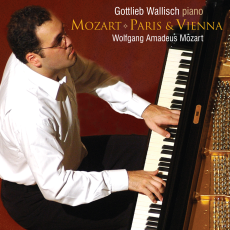Gottlieb Wallisch - Mozart: Paris & Vienna - BBC Music Online
Austrian pianist Gottlieb Wallisch's second solo album for Linn Records is every bit as good as his first, 2010's Mozart in Vienna. Building on the previous disc's Viennese explorations, the programme mixes well-known pieces with less instantly hum-along-able ones such as the Six Variations in F Major K398 on "Salve tu, Domine", from Giovanni Paisiello's now long-forgotten opera, I filosofi immaginarii.
There's also a welcomed sunshiny feel to things. Perhaps this is because, although life was rarely free from complications for Mozart, by the time he wrote the earliest of these works he had broken free from the twin ruling thumbs of his father Leopold and of stifling court service. Life as a free agent was opening up before him.
The disc opens with the popular Andante in F Major K616, originally composed for barrel organ. Sweet and chirpy, it's particularly enjoyable here for the way in which Wallisch's playing brings out the score's strong echoes of its original mechanical dedicatee, yet with just enough human flesh and blood to make the music genuinely charming.
In some ways it's an interesting choice of opener though, considering the impression of almost mechanical precision that Wallisch then continues to give. This is first apparent in the virtuosic opening movement of the subsequent Piano Sonata No.10 in C Major K330, and then throughout the rest of the programme.
Wallisch's treatment of some of the most technically challenging passages Mozart wrote for the keyboard is certainly deft, but at times it's also so precise that it feels disconcertingly as though he has a little inner metronome ticking away. Still, if you can ignore that impression for just a moment, then you'll also admire the fact that these passages are also characterised by a beautifully warm and delicate touch.
In fact, there is plenty to appreciate on this disc, not least the sheer simple grace of his expression. The Allegro in B Flat Major K400 is a delightful display of gentle exuberance, and movements such as K330's "Andante Cantabile" and the Adagio in B Minor K540 show that he is equally capable of quiet profundity.

